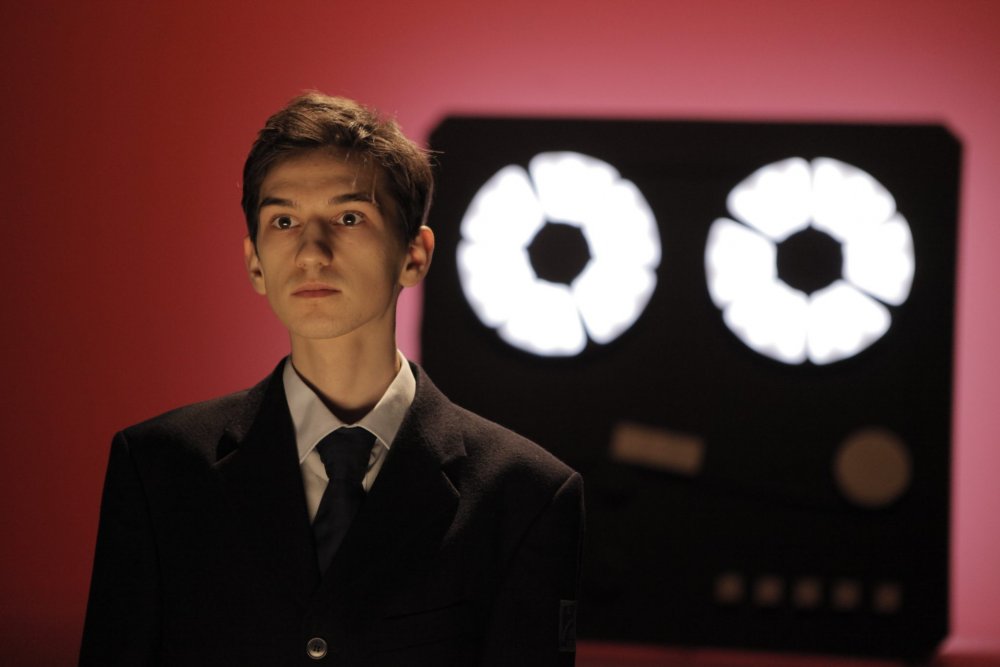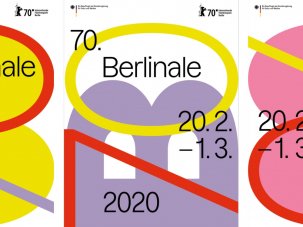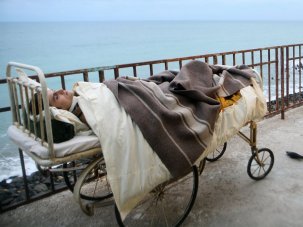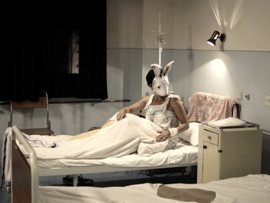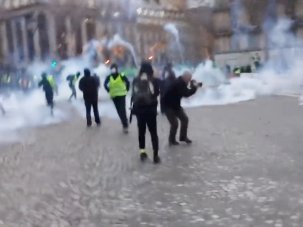In the autumn of 1981, a chalk slogan appeared on the wall of the Communist Party HQ in Botoșani, Romania. “We are sick of waiting in endless queues,” it read. The secret police, shocked anyone would dare to publicly condemn the food shortages rampant under the Ceaușescu regime, scrambled to find the culprit, as more graffiti appeared calling for freedom, worker rights and tolerable living conditions.
Romania 2020
128 mins approx
Director Radu Jude
Cast
Securitate officer Bogdan Zamfir
Mugur Călinescu Şerban Lazarovici
The mother Ioana Iacob
The father Şerban Pavlu
Original theatrical title Tipografic majuscul
► Trailer
The dissenter turned out to be a 16-year-old student, Mugur Călinescu. Excerpts from his case files were used in the script of Gianina Cărbunariu’s theatre piece Uppercase Print. In his film of the same name, screening in the Berlinale’s Forum section, director Radu Jude intersplices a performance of the play with TV shows and public service broadcasts from the era. It’s a dialectical weave as charged with rage as it is cerebral, showing the gulf between the regime’s official story of joyous harmony and the traces of private suffering and rebellion it could not suppress completely.
From turning out the black-humoured social satire the Romanian New Wave is famed for with films such as Everybody in Our Family (2012), Radu Jude has evolved into a wholly singular, and constantly inventive, firebrand of political conscience, calling out state-sanctioned injustices in films as bold in stretching what the medium can do as they are in pushing conservatives’ buttons. I Do Not Care If We Go Down In History As Barbarians (2018), and The Exit of the Trains (2020), a collaboration with Adrian Cioflâncă also premiering at the Berlinale, use performance and archive excavation to bear witness to Romania’s complicity in Holocaust pogroms. Rooted in an evergreen dissident appeal to truth and memory, their echoes in today’s resurgent nationalism are pointed.
☞ Strongmen take all at Karlovy Vary 2018
Uppercase Print, too, is a film about the dissemination and veiling of facts, and the danger of civil literacy to an autocratic state that sees no value in education beyond indoctrination. An autodidact, Călinescu (Serban Lazarovici) gleans ideas from listening clandestinely to US-funded Radio Free Europe; he’s the kind of pupil the regime quickly moves to “correct”, or crush.
“Learning teaches us from birth, to be citizens of worth,” students belt out around a piano in found footage. In an amusing TV outtake, a teleprompter fails, to the alarm of glossy presenters exhorting workers to stay upright and toil day and night. Just like rote-learnt lyrics, life under Ceaușescu was scripted. The panic any divergence engendered is palpable in the extreme measures taken to identify Călinescu. Thirty thousand writing samples were lifted and analysed from passport applications, tenants’ association expense lists and other citizen paperwork. After Călinescu’s arrest, amid endless interrogations, his home was bugged, and all close to him suspected by association (Ioana Iacob as his mother is excellent at conveying the weight of persecution). The regime was clear that all words and thoughts belonged to it alone.
The easy thrills of a conventional dramatic reconstruction, fleshed out in period detail, are not offered here. This voicing of documents can feel dry, stilted even, in a studio that’s bare aside from enlarged symbolic touches (a listening device here, a framed Ceaușescu portrait there.) But with good reason. The piercing earnestness, very soon snuffed out, that pours from Lazarovici as he addresses us, his face framed close, stands out all the more against the regime’s language of ruthless depersonalisation.
More than a hundred child informants were roped into collaborating under Ceaușescu, and Uppercase Print is ultimately most concerned with the battle against the internalisation of systemic rot within the private body of the citizenry. Rather than the state’s injustices, it is the betrayal of his friends, Călinescu admits, that hurt most. “Among cowards, you can’t do anything,” he says. A warning for the ages.
-
The Digital Edition and Archive quick link
Log in here to your digital edition and archive subscription, take a look at the packages on offer and buy a subscription.




